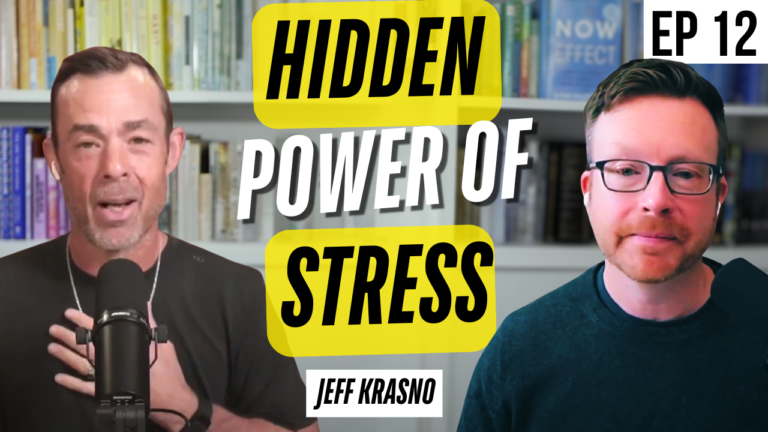
Personal Growth

Founder and Psychologist
by Dr. Elisha Goldstein
“The stress response isn’t the enemy – it’s a tool. The key is learning how to use it.”
– Jeff Krasno
We Explore:
00:00 – Stress Isn’t the Enemy: Understanding Its Dual Nature
05:00 – Jeff’s Wake-Up Call: From Symptoms to Self-Healing
10:30 – How the Mind and Body Really Work Together
15:05 – Letting Go to Grow: The Journey of Self-Discovery
20:05 – Why Balance (Not Perfection) Is the Goal
22:13 – Modern Life Is Too Comfortable—Here’s Why That Matters
26:57 – Hormesis: How Short-Term Stress Builds Long-Term Strength
34:10 – How to Stay Grounded in Emotional Chaos
45:08 – Turning Adversity Into Resilience and Purpose
1:00:05 – You Can Change: The Science and Spirit of Hope
SHOWNOTES
Most of us think of stress as something to avoid. We associate it with overwhelm, exhaustion, and burnout. But what if stress wasn’t inherently bad? What if, instead of being something to eliminate, it was something we could harness for resilience, longevity, and even joy?
In this episode of The Emotional Longevity Podcast, I sit down with Jeff Krasno, founder of Commune, host of the Commune Podcast, and author of the brand-new book Good Stress: The Health Benefits of Doing Hard Things.
Jeff is flipping the script on stress, showing us how to lean into discomfort in ways that strengthen both body and mind.
Rethinking Stress: Why It’s Not All Bad
We tend to think of stress as something harmful—and in its chronic form, it can be. But Jeff explains that stress itself isn’t the problem. The real issue is how we relate to it.
“If you really look at stress and the stress response, it’s completely adaptive,” Jeff shares. “It’s built into our biology for a reason.”
Stress, in its healthiest form, is what helps us grow. It’s what builds stronger muscles, a sharper mind, and deeper emotional resilience. But modern life has distorted this balance – keeping us in a constant state of stress instead of allowing for recovery.
Jeff explains that good stress, or hormesis, is about exposing ourselves to the right kind of challenges – whether physical, emotional, or mental—in ways that strengthen us rather than deplete us.
How Stress Became a Chronic Problem
The problem isn’t stress itself, but the fact that we rarely let it turn off.
“If you think of our ancestors, they’d have moments of intense stress—hunting, escaping danger – but then the stress would be gone,” Jeff says. “The issue today is that the rattlesnake never slithers off the path.”
In other words, we stay triggered all the time – by work, by technology, by constant stimulation. And without moments of true recovery, stress goes from being beneficial to harmful.
The Role of Good Stress in Longevity
Jeff shares how, after receiving a pre-diabetes diagnosis, he had to make a shift – not just physically, but emotionally.
“I realized I wasn’t just dealing with my health—I was dealing with my story about myself. And that was just as important as the physiological changes I needed to make.”
Through research and self-experimentation, he discovered that intentional discomfort—whether through physical challenges, emotional resilience, or mindset shifts—can be a powerful tool for well-being.
✅ Reframing challenges – Seeing stress as an opportunity to grow rather than something to avoid
✅ Practicing mindfulness under pressure – Learning to regulate emotions and stay present, even in difficult moments
✅ Building emotional resilience – Engaging in tough but meaningful conversations, facing fears, and embracing uncertainty
The key, Jeff says, is not avoiding stress, but shifting our relationship with it, so that it becomes a catalyst for strength and longevity.
Embracing Discomfort: A Key to Growth
It’s not just about physical stressors – this applies to our emotional health, too.
“We avoid hard conversations because they feel uncomfortable. But when we push through them, that’s when we create real connection,” Jeff explains.
Avoiding stress—whether in relationships, work, or personal growth – keeps us stuck. Leaning in, with intention, is what creates resilience.
What This Means for You
You don’t need to run marathons or take ice baths to benefit from good stress. Small, daily challenges help build resilience:
Pause when you notice stress. Instead of reacting, see it as an opportunity to strengthen yourself.
Start small. Try a 30-second cold shower, a tough conversation, or simply going a bit longer between meals.
See stress as a tool, not an enemy. When used wisely, it makes you stronger.
Final Thoughts: Stress Can Be a Gift – If We Use It Right
Stress is part of life. The question isn’t how to eliminate it, but how to use it to our advantage.
“We have far more agency over our health than we realize,” Jeff reminds us. “Upward spirals are just as possible as downward spirals.”
If you’re ready to transform your relationship with stress, check out Jeff’s new book Good Stress: The Health Benefits of Doing Hard Things.
Want to Go Deeper?
Uncover the Power Within isn’t just a coaching program – it’s a supportive community built on connection, meaningful challenge, and real growth. If you’re ready to step into a more resilient, empowered version of yourself, I invite you to schedule a call with me to explore what’s possible.
Subscribe to The Emotional Longevity Podcast for more insights on on reducing stress, building resilience, and living a longer, healthier, happier life.
If this episode resonated with you, consider sharing it with someone who might be navigating challenges or feeling stuck in the discomfort of growth. It might be the reminder they need – that stress, when met with awareness and intention, can become a powerful path to strength and clarity. They can listen to this episode of The Emotional Longevity Podcast or read this blog.
Take care of yourself – you have more strength and wisdom within you than you may realize.